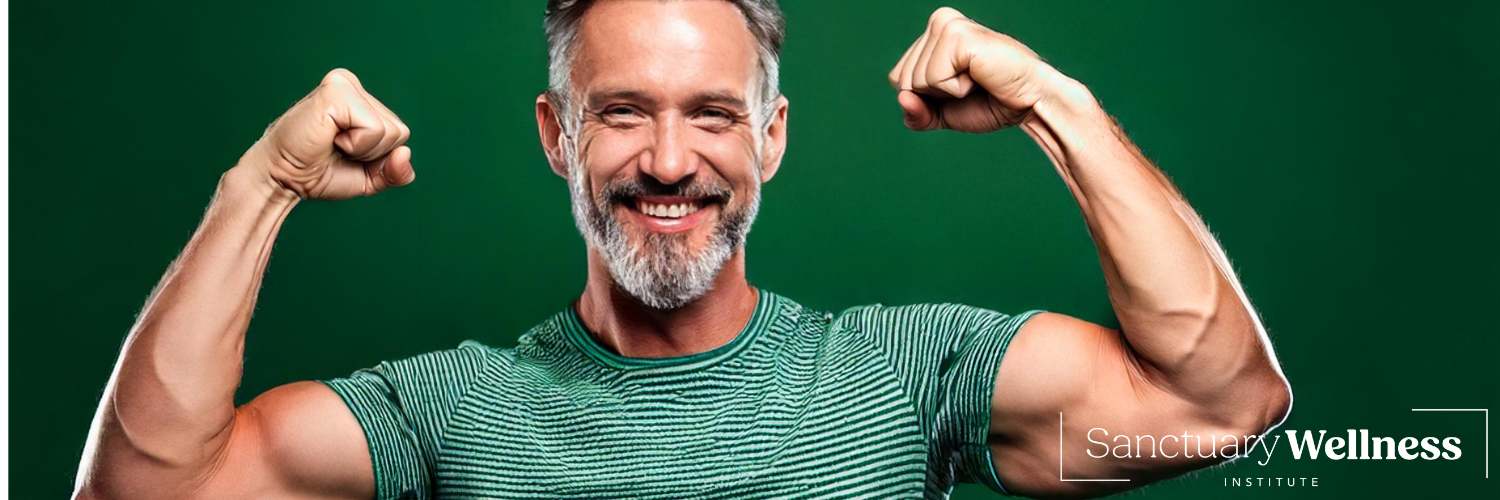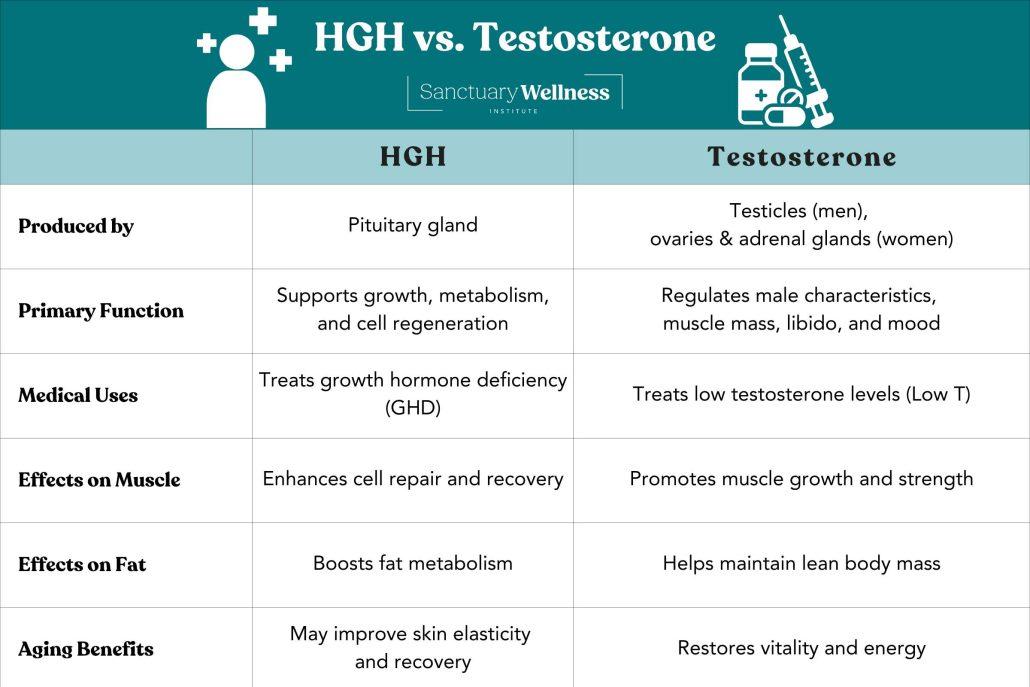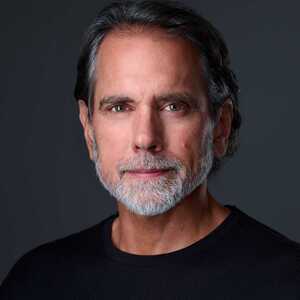- John DiBella
- Published: February 4, 2025
- Fact-checked by Dr. Desiree Granados

When it comes to hormone therapy, two of the most commonly discussed options are human growth hormone (HGH) and testosterone. Both hormones play essential roles in the body, influencing everything from muscle growth and fat metabolism to energy levels and aging. However, they are not the same hormones; each has distinct functions and medical applications.
Understanding the differences between HGH and testosterone will help those considering hormone replacement therapy (HRT) or simply looking to optimize their health. This guide will break down what each hormone does, how they compare, and which one may be best suited for muscle growth, anti-aging, and overall well-being.
About Testosterone
Testosterone is the primary male sex hormone, but it is also present in women in smaller amounts. It is produced mainly in the testicles in men and in the ovaries and adrenal glands in women. Testosterone is responsible for several important bodily functions, including:
- Development of male sexual characteristics (deep voice, facial hair, increased muscle mass)
- Regulation of libido (sex drive)
- Maintenance of muscle mass and strength
- Bone density and overall skeletal health
- Red blood cell production and oxygen circulation
- Mood regulation and cognitive function
Testosterone levels naturally peak during adolescence and early adulthood, then gradually decline after age 30. While this decline is normal, some individuals experience a more severe drop, leading to a condition known as low testosterone (low T).
Signs of Low Testosterone
If you have low testosterone levels, you may experience:
- Decreased muscle mass and strength
- Fatigue and low energy levels
- Reduced libido and sexual dysfunction
- Increased body fat, particularly around the abdomen
- Mood swings, irritability, and depression
- Difficulty concentrating or memory issues
For individuals suffering from low T, testosterone replacement therapy (TRT) can help restore hormone levels to a normal range, improving energy, muscle mass, libido, and overall well-being. TRT is available in various forms, including injections, gels, patches, and pellets.
About HGH (Human Growth Hormone)
Human growth hormone (HGH), also known as somatotropin, is produced by the pituitary gland and plays a vital role in growth, cell regeneration, and metabolism. While it is most commonly associated with childhood growth, HGH remains essential throughout life, influencing:
- Growth and development in children and adolescents
- Metabolism, fat-burning, and energy levels
- Tissue repair, muscle recovery, and skin health
- Bone density and joint health
- Immune system function
HGH is commonly prescribed for individuals with growth hormone deficiency (GHD). In children, a deficiency can result in stunted growth, while in adults, low HGH levels may cause fatigue, reduced muscle mass, weight gain, and poor recovery from exercise.
Medical Uses of HGH Therapy
Doctors may prescribe HGH therapy for:
- Children with growth disorders (such as Turner syndrome or idiopathic short stature)
- Adults with HGH deficiency (often due to pituitary disorders)
- Muscle-wasting diseases, such as those associated with HIV/AIDS
- Certain metabolic disorders
HGH therapy is typically administered through injections, as oral supplements claiming to boost HGH levels are generally ineffective.
What’s the Difference Between HGH and Testosterone?
While both testosterone and HGH are hormones essential to growth, energy, and overall health, they function differently. The main distinction between the two is that testosterone primarily affects male sexual characteristics and muscle-building, whereas HGH plays a broader role in growth, tissue repair, and metabolism.
Below is a helpful chart, outlining the primary features of HGH vs. testosterone:

Which Hormone Therapy Is Better for Muscle Growth?
For muscle growth and strength, testosterone is a better option than HGH. It directly stimulates protein synthesis, leading to:
- Increased muscle mass and density
- Greater strength and endurance
- Faster recovery from workouts
This is why testosterone therapy is popular among individuals looking to boost athletic performance or combat age-related muscle loss.
While HGH does support muscle maintenance, it does not directly promote muscle hypertrophy (growth) in the same way testosterone does. Instead, it helps by:
- Enhancing cell regeneration
- Boosting fat metabolism, making muscles more defined
- Aiding post-workout recovery
For individuals looking to bulk up quickly, testosterone is the better choice. However, combining testosterone with HGH can enhance overall body composition, promoting lean muscle while reducing fat.
Which Is Best for Me: TRT or HGHT?
Choosing between hormone replacement therapy that uses HGH or testosterone depends on your individual health needs and goals.
Testosterone Therapy Is Best If You:
- Have clinically low testosterone diagnosed by a doctor
- Experience muscle loss, fatigue, and low libido
- Want to improve energy levels, strength, and mood
- Are looking for a direct way to boost muscle mass
HGH Therapy Is Best If You:
- Have growth hormone deficiency (GHD)
- Struggle with slow recovery, chronic fatigue, or metabolic decline
- Want to enhance fat loss and improve skin, joints, and overall vitality
- Are seeking anti-aging benefits
If you’re unsure which therapy is right for you, consult with a hormone specialist. They can evaluate your hormone levels, symptoms, and medical history to determine the best course of action.
Conclusion
Both HGH and testosterone are powerful hormones, but they serve different purposes. Testosterone is the primary driver of male health, muscle growth, and strength, while HGH is essential for growth, tissue repair, and metabolism.
For muscle-building and strength, testosterone therapy is the best choice. However, for fat loss, recovery, and anti-aging benefits, HGH therapy may be beneficial. Some individuals use both therapies together under medical supervision for optimized performance and body composition.
If you’re experiencing symptoms of low testosterone, such as fatigue, reduced muscle mass, low libido, or mood swings, Sanctuary Wellness Institute offers testosterone replacement therapy. Our team of medical professionals can assess your hormone levels, discuss your health goals, and develop a personalized treatment plan to restore your vitality and well-being.
How we reviewed this article:
- George N. Nassar, Stephen W. Leslie (2023). Physiology, Testosterone
https://www.ncbi.nlm.nih.gov/books/NBK526128/ - Joshua E. Brinkman, Muhammad Ali Tariq, Logan Leavitt, Sandeep Sharma (2023). Physiology, Growth Hormone
https://www.ncbi.nlm.nih.gov/books/NBK482141/ - Robert Wolfe PhD, Arny Ferrando PhD, Melinda Sheffield-Moore PhD, Randall Urban MD (2019). Testosterone and Muscle Protein Metabolism
https://www.sciencedirect.com/science/article/abs/pii/S0025619619306445 - Michael Højby Rasmussen (2008). Obesity, growth hormone and weight loss
https://www.sciencedirect.com/science/article/abs/pii/S0303720709004377 - Daniel J. Green, Lauren C. Chasland, Bu B. Yeap & Louise H. Naylor (2024). Comparing the Impacts of Testosterone and Exercise on Lean Body Mass, Strength and Aerobic Fitness in Aging Men
https://sportsmedicine-open.springeropen.com/articles/10.1186/s40798-024-00703-x
Current Version
February 04, 2025
Written By
John DiBella
Fact-checked By
Dr. Desiree Granados
Editorial Process
Our Editorial Process

John DiBella is the co-founder and CEO at The Sanctuary Wellness Institute. His goal is to foster healthier lifestyles to improve individuals’ quality of life and health span through online medical and non-medical services. When he’s not writing health & wellness articles for The Sanctuary, he enjoys hiking, camping, surfing and sailing.







